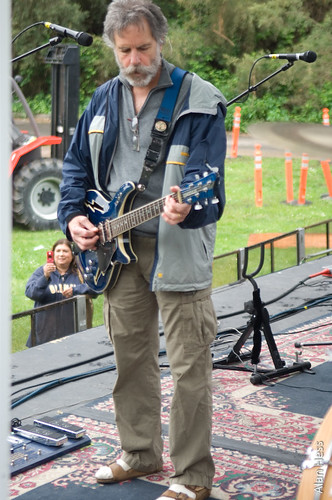For Buck Owens, Bobby & Ratdog played "A-11" at tonight's show in Philly-
Lyrics are:
I don't know you from Adam
But if you're gonna play the jukebox
Please don't play A - Eleven.
I just came in here from force of habit
I don't intend to spend too much time in here
But I heard you *matchin' for the music
And if you play A- Eleven - there'll be tears.
I don't know you from Adam
But if you're gonna play the jukebox
Please don't play A - Eleven.
This used to be our favorite spot
And when she was here it was heaven
It was here she told me that she loved me
And she always played A - Eleven.
I don't know you from Adam
But if you're gonna play the jukebox
Please don't play A - Eleven...
.....................
Country music icon Buck Owens dies
(Reuters)
26 March 2006
SAN FRANCISCO - Honky-tonk star Buck Owens, who sold more than 16 million albums and popularized country entertainment on television as host of “Hee Haw,” died on Saturday at age 76.
Owens, who helped spread the twangy “Bakersfield sound” as an antidote to Nashville’s slick country music, died of heart failure at his home, said his keyboard player Jim Shaw. The night before, he had performed his usual twice-weekly concert at his entertainment complex, Buck Owens’ Crystal Palace.
“He was one of the true innovators,” Shaw said. “He did it his own way, an outside gunslinger type who used his own band and made music in Hollywood rather than Nashville. That free spirit made him important to a lot of people.”
Owens honed his craft in the rowdy bars of Bakersfield, a gritty oil and farming town about 100 miles north of Los Angeles. He played it loud and kept it simple, performing tunes that were more escapist than the hard-life tales of Bakersfield colleague Merle Haggard.
Haggard worked as Owens’ bass player in 1962 and came up with the name “The Buckaroos” for Owens’ band.
“We’ve been in many battles together (always on the same side),” Haggard said in a statement. “Over the last few years, we’d become closer than we ever realized ... We were outlaws together.”
Owens’ first top-10 hit was “Under Your Spell Again” in 1960. Between 1963 and 1967, when mainstream country music was flirting with complex arrangements, Owens enjoyed 15 No. 1 hits, including “I’ve Got a Tiger by the Tail,” ”My Heart Skips a Beat” and “Together Again.”
“In Nashville, they were producing things with softer, more syrupy sounds,” Owens told biographer Nicholas Dawidoff in the book “In the Country of Country. “I’m one of those turn-on-the-damn-thing-and-here-we-go folks.”
Bakersfield sound
The “Bakersfield sound,” a hard-hitting rhythm highlighted by prominent vocals, loud drums and twangy steel-guitar solos, influenced artists in a wide range of genres.
A song Owens made a hit, “Act Naturally,” was recorded by the Beatles with Ringo Starr on vocals in 1965, the same year that Ray Charles enjoyed a top-10 pop hit with a cover of Owens’ “Cryin’ Time.”
Creedence Clearwater Revival mentioned Owens in the song ”Looking Out My Back Door” and the Grateful Dead cited him as a major influence. Country traditionalist Dwight Yoakam teamed with Owens in the late ’80s for a duet on a hit remake of ”Streets of Bakersfield.”
“We’re going to miss ol’ Buck but we’re going to bring him back tonight,” said Grateful Dead guitarist Bob Weir. He said he would he would play a tribute to Owens in a Philadelphia show on Saturday by the Dead spinoff band Ratdog.
In 1968, Owens made an unusual career detour by signing to host the country comedy television show “Hee Haw,” a move he knew would hurt his career since it would typecast him as a hillbilly clown. But the money was worth it. He recalled taping a year’s worth of shows in two one-week stints, and being paid $200,000 at the end of each stint.
Owens was a shrewd businessman who invested in newspapers, radio and TV stations and real estate.
Alvis Edgar Owens Jr. was born near Sherman, Texas, in 1929. His family moved west in the early 1930s as part of the great Dust Bowl migration, settling in Mesa, Arizona. They lived in dire poverty and moved constantly in search of work in the fields.
Owens recalled christening himself “Buck” when he was 3 or 4 but could not remember if he had named himself after a horse or a mule. He left school at 13 and played steel guitar in Mesa honky-tonk bars, to the consternation of his God-fearing parents.
Print this article
4 weeks ago






